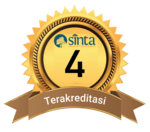COMMUNICATION WITH WHATSAPP: POLITENESS IN LANGUAGE OF STUDENTS OF THE POLIMARIN MARINE TRANSPORTATION STUDY PROGRAM IN THESIS PREPARATION
DOI:
https://doi.org/10.31316/skripta.v10i2.7282Abstract
The communication relationship between students and lecturers during the thesis writing guidance process is usually done via WhatsApp. Unfortunately, there are still some students who have not applied the principles of politeness so that the messages sent to the supervisor can potentially be impolite. This study aims to describe the politeness of the language of students of the Polimarin Marine Transportation Study Program to the supervisor in writing a thesis. The problem studied in this study is the compliance and violation of the principles of politeness of the language of students to the supervisor via WhatsApp messages. The method used in this study is a qualitative descriptive research method. The results of the study show that students comply with the principles of politeness more than they violate the principles of politeness. The compliance with politeness carried out by students is compliance with maxims of rather than feelings, maxims of generosity, maxims of agreement, and maxims of agreement with a total of 20 utterances. In pragmatics, proverbs can be interpreted as a type of speech that adheres to the principles of politeness. Furthermore, in violations of politeness, there are 15 student utterances that violate the principles of politeness. Based on these results, students actually already have an awareness of the importance of politeness when communicating.
References
Budiarta, I. W., & Rajistha, I. G. N. A. (2018). Politemess In “Adit dan Sopo Jar-wo” Animation. Lingua Cultura, 12 (1), 25–30. https://doi.org/doi.org/10.21512/lc.v12i1.1822
Brown, Penelope & Stephen C. Levinson. (1987). Politeness: Some Universals in Language Usage. Cambridge University Press. Cummings, Louise. 2007.
Chaer, A., dan Agustina, L. (2004). Sosiolinguistik. Rineka Cipta.
Chaer, Abdul. (2010). Kesantunan Berbahasa Indonesia. Jakarta: Rineka Cipta.
Cummings, Louise. (2007). Pragmatik sebuah Perspektif Multidisipliner. Yogyakarta: Pustaka Pelajar.
Fitriah, & Hidayat, D. (2018). Politeness: Cultural Dimensions Of Linguistic Choice. Indonesian Journal of English Education, 5(1), 27–34.
Jayanti, M. dan Subyantoro. (2019). Pelanggaran Prinsip Kesantunan Berbahasa pada Teks di Media Sosial. Jurnal Sastra Indonesia, Vol. 8, No. 2, hlm. 119-128. https://journal.unnes.ac.id/sju/index.php/jsi/article/view/33718/14117
Kamlasi, I. (2017). The Positive Politeness in Conversations Performed by the Students of English Study Program of Timor University. METATHESIS, 1(2), 68–81.
Leech, Geoffrey. (1983). Principles of Pragmatics. terjemahan M.D.D. Oka. 1993. Prinsip-Prinsip Pragmatik. Jakarta: UI Press. London: Logman.
Mardikantoro, Haribakti. (2012). Pilihan Bahasa Masyarakat Samin dalam Ranah Keluarga. Journal of Culture literature and Linguistik. Humaniora. Vol.24, No. 3 Oktober 2012:345-357.
Nadar, F. X. (2013). Pragmatik dan Penelitian Pragmatik. Yogyakarta: Graha Ilmu.
Ngalim, Abdul. (2015). Sosiolinguistik Suatu Kajian Fungsional. Sukoharjo: Jasmine.
Nurfaedah, dan Jura, S. (2020). Analisis Kesantunan Proses Komunikasi Mahasiswa dengan Dosen melalui Aplikasi WhatsApp terhadap Efektifitas Penggunaan Bahasa. Jurnal Onoma: Pendidikan, Bahasa, dan Sastra, Vol. 6, No. 2, hlm. 680-692. https://e-journal.my.id/onoma/article/view/427/346
Pranowo. (2012). Berbahasa secara Santun. Pustaka Belajar.
Prayitno, Joko Harun. (2011). Kesantunan Sosiolinguistik: Studi Pemakaian Tindak Tutur Direktif di Kalangan Andik SD Berbudaya Jawa. Surakarta: Universitas Muhammadiyah Surakarta
Rokhman, Fathur. (2003). Pemilihan Bahasa dalam Masyarakat Wibahasa: Kajian Sosiolinguistik di Banyumas. Disertasi. Yogyakarta.UGM.
Rustono. (1999). Pokok-Pokok Pragmatik. Semarang: CV IKIP Semarang Press
Santoso, B wahyudi Joko. (2020). Kesantunan berbahasa. Semarang: LPPM Unnes
Sugiyono. (2021). Metode Penelitian Kuantitatif, Kualitatif, dan R&D. Alfabeta.
Tretyakova, T. P. (2016). On Politeness in Translation. Journal of Siberian Feder-al University, Humanities & Social Sciences 3, 597–606.
Tubi, D.M., Djunaidi, B., dan Rahayu, N. (2021). Analisis Kesantunan Bahasa Mahasiswa dalam Pesan WhatsApp terhadap Dosen Program Studi Pendidikan Bahasa Indonesia. Jurnal Ilmiah Korpus, Vol. 5, No. 1, hlm. 26-34. https://ejournal.unib.ac.id/korpus/article/view/13157/7616
Wardhono, A. (2013). An Analysis On Politenesss In SMS Of The Students To The Lecturers Of English Department UNIROW Tuban. Didaktika, 19(2), 71–80.
Wulansafitri, I. dan Syaifudin, A. (2020). Kesantunan Berbahasa dalam Tuturan Film My Stupid Boss I. Jurnal Sastra Indonesia, Vol. 9, No. 1, hlm. 21-27. https://journal.unnes.ac.id/sju/index.php/jsi/article/view/33847/15665
Yule, George. (1996). Pragmatik. Yogyakarta:Pustaka Pelajar.
Yuliyawati, S.N. (2020). Kesantunan Berbahasa Mahasiswa pada Pesan WhatsApp kepada Dosen. Indonesian Language Education and Literature, Vol. 5, No. 2, hlm. 198-208. https://www.syekhnurjati.ac.id/jurnal/index.php/jeill/article/download/5297/2978
Zamzani. (2007). Kajian Sosiopragmatik. Yogyakarta: Cipta Pustaka.
Downloads
Published
How to Cite
License
Copyright (c) 2024 Alimatussa'diyah

This work is licensed under a Creative Commons Attribution-NonCommercial 4.0 International License.
- Authors retain copyright and grant the journal right of first publication with the work simultaneously licensed under a Creative Commons Attribution License that allows others to share the work with an acknowledgment of the work’s authorship and initial publication in this journal.
- Authors are able to enter into separate, additional contractual arrangements for the non-exclusive distribution of the journal’s published version of the work (e.g., post it to an institutional repository or publish it in a book), with an acknowledgment of its initial publication in this journal.
- Authors are permitted and encouraged to post their work online (e.g., in institutional repositories or on their website) prior to and during the submission process, as it can lead to productive exchanges, as well as earlier and greater citation of published work.





